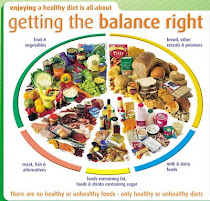Everyone knows what nutrients are, carbohydrates, calcium, protein, etc., but did you know that they are separated into different categories?
There are two different categories for nutrients, Macro Nutrients such as carbohydrates, protein, and fat, and Micro Nutrients such as iron, calcium, and potassium.
Carbohydrates:
Out of all the Macro Nutrients, carbohydrates may be the most misunderstood. Many diets advise avoiding carbs to maintain a healthy weight, and label carbs as "bad". On the contrary, for an athlete, certain carbs are good! Carbohydrates are the Macro Nutrient that provide energy for you body first. When you're sprinting in a race or running down the soccer field, the energy you're using comes from the carbohydrates you consumed earlier in the day. The important thing is to make sure you are getting the right type of carbs. Carbs from whole grain wheat, vegetables, fruit, and beans will promote good health by helping to deliver vitamins and fiber throughout your body. Carbs that are easily digested, such as white bread, pastries, sodas, and white rice can promote weight gain and diabetes.
Proteins:
When most people think of athletes, they think of big and muscular people, who spend all of their time in the weight room and only eat protein rich foods. However, it is proven that having a over excessive protein intake does not increase how much muscle you grow or how fast it will grow. Sure protein makes up muscles, but you don't need to eat protein bars or supplements like that, you can get it from just eating normally. The best way to build up muscles is just to practice and train regularly. In fact, too much protein can be detrimental to your health, and can cause dehydration, calcium loss, and sometimes even kidney failure. Some good sources of protein rich food are fish, other lean meats, eggs, soy, dairy, nuts, and peanut butter.
Fats:
Everyone needs a certain amount of fat everyday, especially athletes. When you exercise for an extended period of time, your body burns through energy from carbs quickly, and needs the long term energy that fats provide. However, just like carbs, there are good sources of fat and bad sources of fat. As an athlete, you should try to eat the healthier fats, such as the unsaturated fats found in vegetable oil. When you eat fats is also important. Most fats slow digestion, so you probably should avoid eating fats for a few hours before and after your workout.
Vitamins and Minerals:
While vitamins and minerals do not provide your body with energy, they play an important role. vitamin D and calcium help you to develop strong bones and you need iron for your blood cells to carry oxygen throughout your body. Certain minerals, such as potassium, calcium, and sodium are called electrolytes. Electrolytes are very important when you exercise, because can effect the amount of water in your body during muscular activity. If you eat a well balanced diet, you shouldn't need to take supplements with high doses of minerals, as it is proven that they don't improve your performance, and may actually be bad for you.
How Much:
Now that you know about the macro and micronutrients, you may be asking how much we should get of each. Knowing how many micronutrients is the easy part, as it can be measured by a set amount, no matter how many calories you eat a day. The only variable that affects the amount of micronutrients one needs is his or her age and gender. For example, teenage girls aged fifteen to seventeen need 1,300 mg of calcium every day. It doesn't matter whether they are intense athletes that are eating 4,000 calories a day or sleep-addicts only eating 1,500 calories a day. All teenage girls from fifteen to seventeen need 1,300 mg of calcium. Macronutrients, on the other hand, are a little bit trickier. Dieticians don't give you a set amount for how many macronutrients you should eat a day, rather, a percentage of your caloric intake. After doing a little math, you can figure out about how many carbohydrates, proteins and fats you need to eat a day. First, you need to calculate your recommended caloric intake using a Calorie Calculator (see post, "Recommended Caloric Intake" for link). Then, find out what percentage should be from each macronutrient. The percentages are, 45 – 65% from carbohydrates, 10 – 35% from protein, and 20 - 35% fats. Using these percentages, you can calculate how many of each of the macronutrients you need in your everyday diet.
Calcium:
This is not specifically directed towards teenage athletes, but to all teens when I ask, what does osteoperosis mean to you? It's a very crippling disease in which bones become brittle and soft due to a lack of calcium. It is rare for someone to get osteoperosis before age 65, but it doesn't mean that teens should not worry about it. It is critical that teenagers get their calcium now because 1/2 of the body's skeleton is formed in the teen years. Sadly, less that 50% of the teenage population in America is getting enough calcium. Girls are four times more likely to get osteoperosis because only 12% of girls get the recommended amount of calcium. And just incase you're wondering, the recommended amount of micronutrients is almost always the same no matter what your recommended caloric intake is. So, although the micronutrients are called micronutrients, it doesn't mean their unimportant! Sometimes, getting the right amount of micronutrients can make all the difference between whether you're healthy or not.
Wednesday, April 28, 2010
Macro & Micro Nutrients
Posted by Kylie at 2:58 PM
Subscribe to:
Post Comments (Atom)





0 comments:
Post a Comment